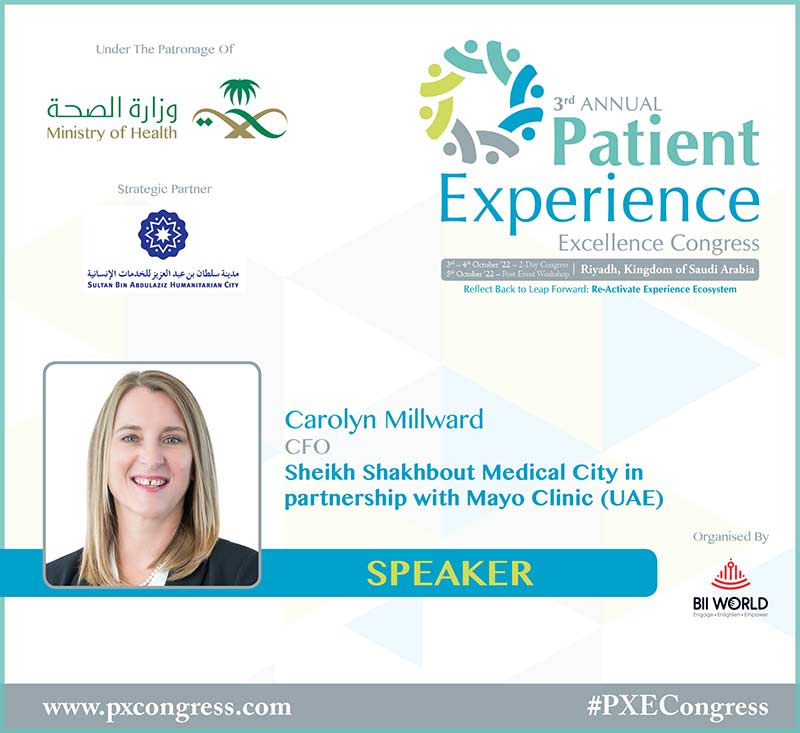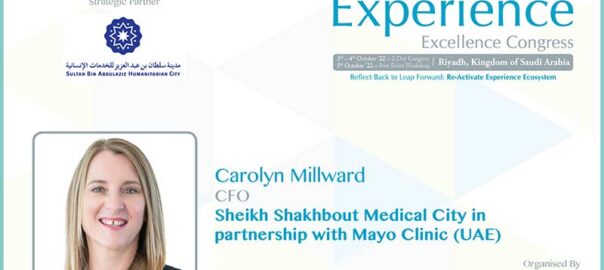Carolyn Millward,
Chief Financial Officer (CFO),
Sheikh Shakhbout Medical City
1. How is the role of the health care CFO evolving today?
The key priorities of finance in health care are evolving rapidly as the industry moves towards value-based care, process automation and financial sustainability. Therefore, the role of the Chief Financial Officer (CFO) is also evolving to meet the needs of the challenging health care landscape. Today, this leadership role requires skills that transcend the traditional scope of finance. Today’s health care CFOs are trusted business partners and strategic thought partners to the CEO and leadership team, with a strong understanding of the macro and micro challenges facing health care currently, as well as the clinical and operational challenges facing their organization. The CFO today needs a deep people focus, which drives an inclusive culture, innovation and clear communication. Automation of processes, accessibility to data and real-time reporting are increasingly important for a CFO.
At SSMC in partnership with Mayo Clinic, we are committed to becoming a regional destination medical center for complex care, and a “Category of One” health care provider. Finance can contribute to this vision by taking all the necessary steps, every day, to create a difference in the patient journey. As the CFO, my task is to be a strategic partner and work with the rest of the organization to deliver on the strategy of bringing a more comprehensive form of patient care to the UAE in a fiscally responsible way.
2. What are some of the biggest financial challenges that today’s health care organizations face? What can CFOs do to prepare for those challenges once they’ve occurred?
Post the pandemic, there is a shortage of nursing and other health care professionals, which has resulted in increased salaries. Supply chains have been affected resulting in increased inflation. Constant change and innovation mean frequent upgrades and expenditure on equipment and technology. All these factors exert constant upward pressure on costs. At the same time, there is a real need, globally, to find a way to deliver health care in a financially sustainable manner.
At SSMC, we are focused on achieving the value equation to reduce costs over time. When superior clinical outcomes, enhanced patient safety and exceptional patient experience combine, the cost of care over time decreases due to factors such as reduced utilization, reduced complication rates and improved operational efficiencies. The increased trust resulting from this value equation drives loyalty and increased demand.
CFOs can also start the dialogue with regulators and organizations to drive the change towards addressing population health and focus on preventative health.
Patient-centered care means we need to take into consideration that we have a more informed patient population with high expectations, looking for easy access and instant service with remote options. A patient’s financial journey can be the source of additional stress and anxiety for patients. Creating a patient financial journey which provides all the necessary information prior to arriving at the facility, ease of access and efficient payment options is a priority for Finance.
Lastly, the health care CFO must work closely with the organization to design the budget to support the needs of the patient at every level, which results in being able to invest in the latest technology, equipment and leading medical talent.
3. How do you think participants will benefit by attending the 3rd Annual Patient Experience Excellence Congress?
I am looking forward to being in Saudi Arabia for the 3rd Annual Patient Experience Excellence Congress, where global speakers will convene to shed light on the latest developments transforming the patient experience. In focus will be topics around financial management, such as revenue cycle management (RCM) and supply chain, and learning more about these will help elevate an organization’s overall performance and outcomes. This is an opportunity for us to exchange knowledge and information with our peers, and it will allow us to relate our personal experiences about how to deal with the types of challenges we face in the industry.



